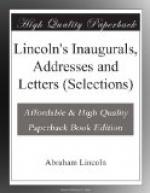The first specimen of Lincoln’s writings that has been preserved is a communication to the voters of Sangamon County in 1832, when Lincoln was for the first time a candidate for the State legislature. It is significant of Lincoln’s imperfect command of English at that time that “some of the grammatical errors” were corrected by a friend before the circular was issued. Although this circumstance makes it impossible for us to judge exactly what his style was at this period, we may be sure that the changes were comparatively slight and that the general form at least was Lincoln’s. The question naturally arises whether there is anything in this first specimen of Lincoln’s writing that suggests, however remotely, the Gettysburg Address and the Second Inaugural. A little study will discover suggestions at least of the later manner, just as in the uncouth and awkward young candidate for the Illinois State Legislature, we can note many traits, intellectual and moral, that distinguish the mature and well-poised statesman of thirty years later. It is the same man, but developed and strengthened, it is the same style, strengthened and refined. If Nicolay and Hay go too far when they say of the address: “This is almost precisely the style of his later years,” it would be quite as wrong to deny any likeness between the two. In the first place, we have the same severely logical treatment of the subject matter, from which Lincoln, a lawyer and public speaker, never departed. Lincoln’s grammar may not have been impeccable at this time, but his thinking powers were already little short of masterly. This, then, is the first element in the makeup of Lincoln’s style, the ability to think straight and consequently to write straight. His legal training, which was then very meagre, cannot account for his logical thinking; it is more correct to say that he later became a successful lawyer because of the logical bent of his mind.
Closely connected with this early development of the form of thinking was Lincoln’s interest in words, and his desire always to use words with a perfect understanding of their meaning. Even in his boyhood he found pleasure in discovering the exact meaning of a new word and in later life he was constantly adding to his verbal stores. Shortly before his inauguration Lincoln remarked to a clergyman, who had asked him how he had acquired his remarkable power of “putting things”: “I can say this, that among my earliest recollections I remember how, when a mere child, I used to get irritated when anybody talked to me in a way I could not understand. I don’t think I ever got angry at anything else in my life. But that always disturbed my temper, and has ever since. I can remember going to my little bedroom, after hearing the neighbors talk of an evening with my father, and spending no small part of the night walking up and down, trying to make out what was the exact meaning of their, to me, dark sayings.”




